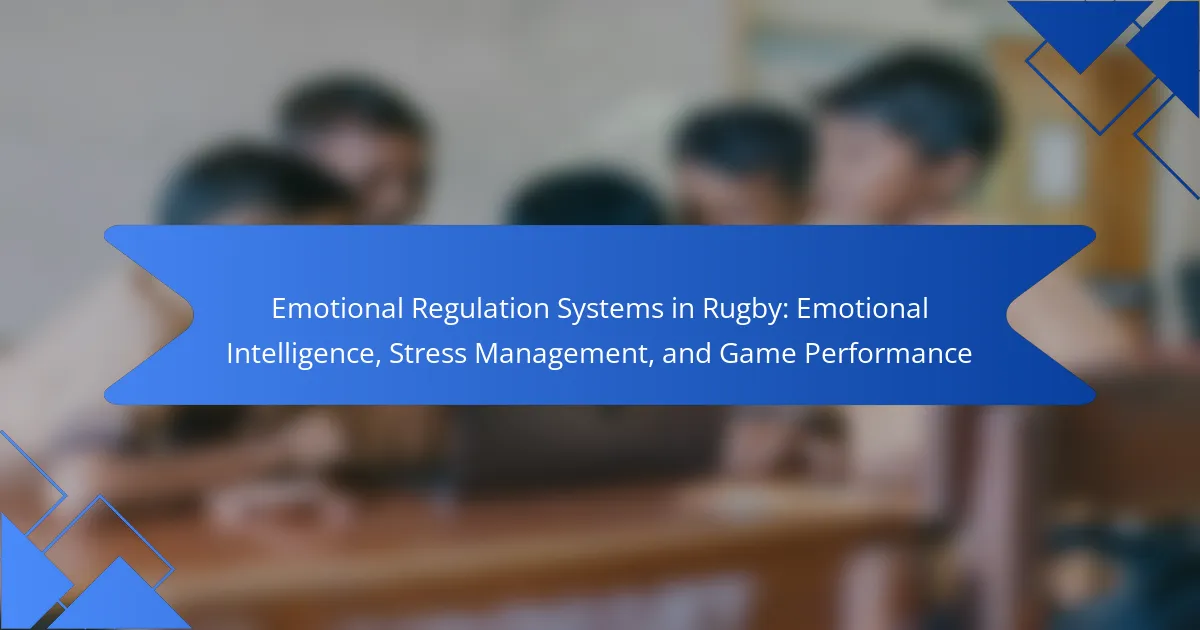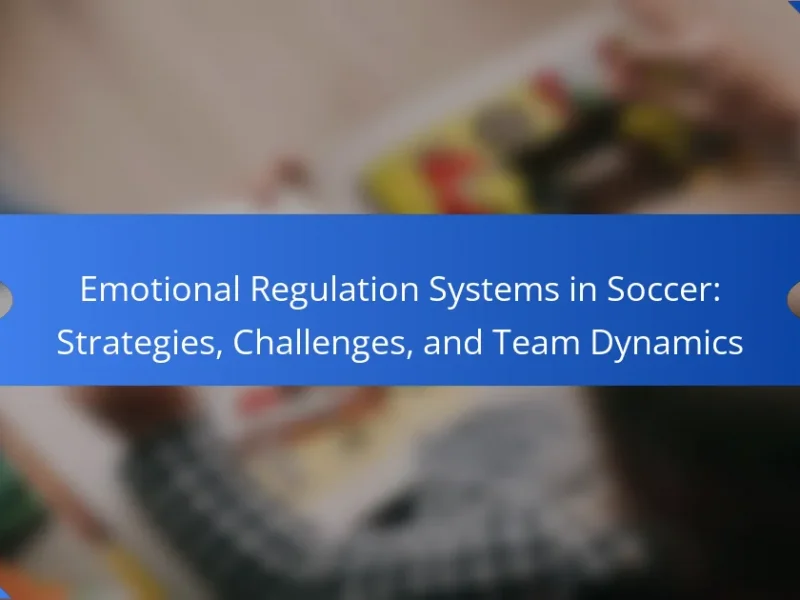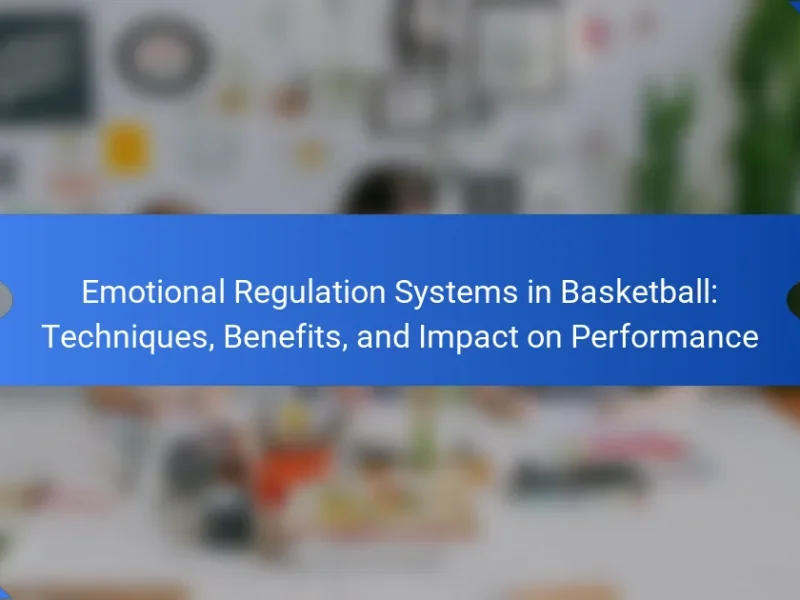Emotional regulation systems in rugby significantly impact player performance and teamwork. This article explores the role of emotional intelligence in enhancing communication, effective stress management techniques for maintaining focus, and the overall benefits of these systems on game outcomes. Understanding these elements can lead to improved resilience and adaptability under pressure, ultimately enhancing on-field success.
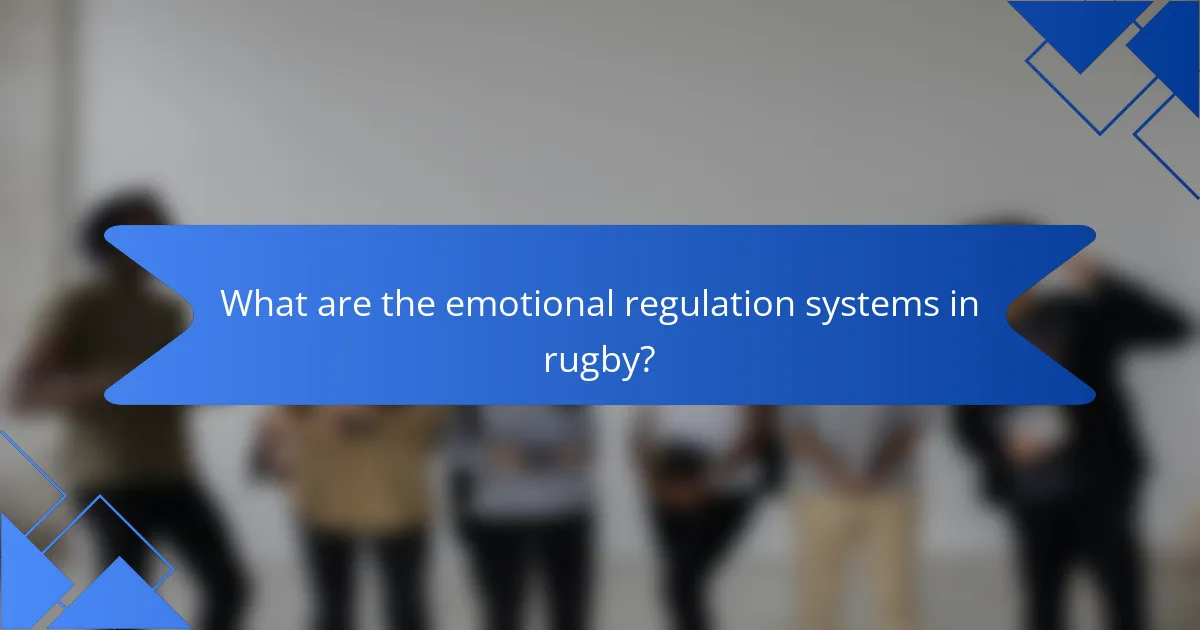
What are the emotional regulation systems in rugby?
Emotional regulation systems in rugby involve emotional intelligence, stress management, and their impact on game performance. Players utilize emotional intelligence to enhance teamwork and communication. Effective stress management techniques, such as mindfulness and visualization, help athletes maintain focus under pressure. Research shows that teams with higher emotional intelligence perform better, achieving improved outcomes on the field.
How does emotional intelligence impact rugby performance?
Emotional intelligence significantly enhances rugby performance by improving emotional regulation and stress management. Players with high emotional intelligence can better handle pressure, leading to improved decision-making and teamwork. This ability to manage emotions fosters resilience during challenging situations on the field. Research shows that teams with emotionally intelligent players often exhibit superior communication and cohesion, resulting in better overall performance. Furthermore, emotional regulation contributes to maintaining focus and composure, essential for executing strategies effectively during high-stakes matches.
What are the key components of emotional intelligence in athletes?
Emotional intelligence in athletes encompasses self-awareness, self-regulation, motivation, empathy, and social skills. These components enhance stress management and game performance. Athletes with high emotional intelligence can better navigate competitive pressures, leading to improved focus and resilience. For example, self-regulation helps in maintaining composure during critical game moments, while empathy fosters teamwork and communication.
What role does stress management play in rugby?
Stress management is crucial in rugby as it enhances emotional regulation, leading to improved game performance. Players who effectively manage stress can maintain focus, make better decisions, and improve teamwork. Studies show that high emotional intelligence correlates with resilience under pressure, enabling athletes to perform optimally during critical moments. Furthermore, stress management techniques, such as mindfulness and visualization, can significantly reduce anxiety, allowing players to concentrate on their skills and strategies. Overall, effective stress management contributes to a positive team dynamic and successful game outcomes.
What techniques are effective for managing stress in rugby players?
Effective techniques for managing stress in rugby players include mindfulness practices, cognitive-behavioral strategies, and physical conditioning. Mindfulness helps players focus on the present, reducing anxiety. Cognitive-behavioral strategies enable players to reframe negative thoughts, enhancing emotional resilience. Physical conditioning improves overall fitness, contributing to lower stress levels during competition. Regular team-building activities also foster a supportive environment, promoting emotional intelligence among players.
How do emotional regulation systems influence game performance?
Emotional regulation systems significantly enhance game performance in rugby by improving emotional intelligence and stress management. Players who effectively manage their emotions can maintain focus, make better decisions, and perform under pressure. Research shows that high emotional intelligence correlates with improved teamwork and communication, leading to better overall performance on the field. Stress management techniques, such as mindfulness and breathing exercises, help players maintain composure during critical game moments, ultimately influencing their ability to execute strategies effectively.
What are the observable effects of emotional regulation on match outcomes?
Emotional regulation significantly impacts match outcomes by enhancing players’ focus and decision-making. Teams with effective emotional regulation systems often experience improved performance under pressure. Research indicates that emotional intelligence contributes to better teamwork and communication, leading to higher success rates in matches. Stress management techniques, such as mindfulness, help players maintain composure, which is crucial during critical game moments. Overall, the ability to regulate emotions correlates with a team’s resilience and adaptability, ultimately influencing their competitive edge.
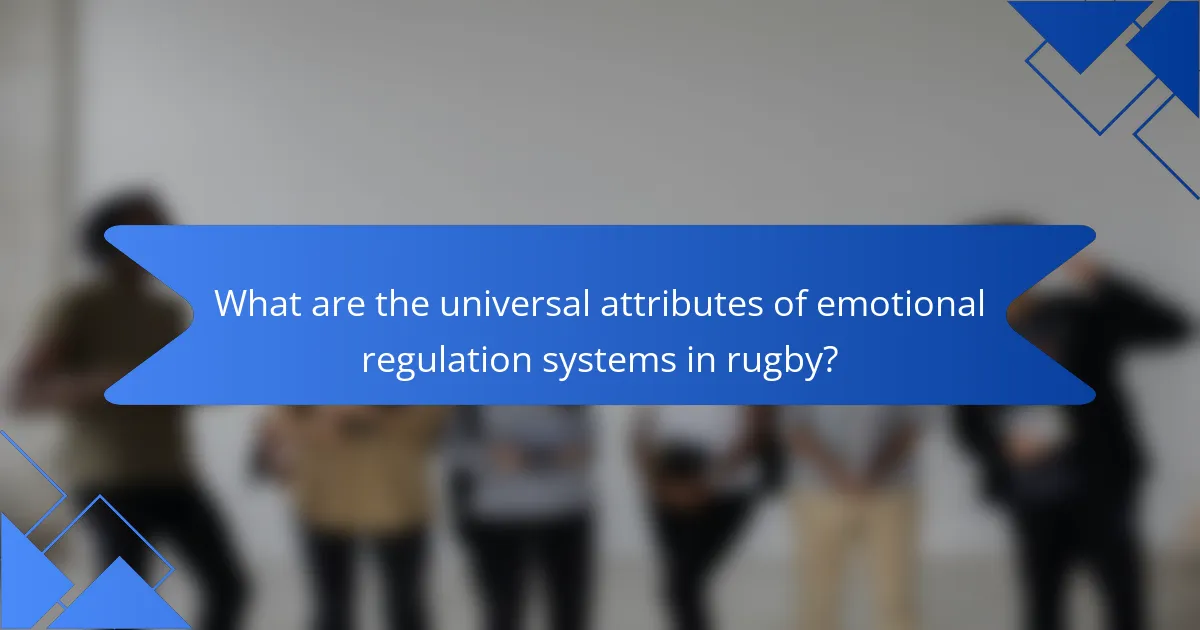
What are the universal attributes of emotional regulation systems in rugby?
Emotional regulation systems in rugby universally involve emotional intelligence, stress management, and performance enhancement. These systems help players maintain composure, enhance teamwork, and optimize decision-making under pressure. Emotional intelligence facilitates better communication and understanding among teammates, while effective stress management techniques improve focus and resilience during games. These attributes collectively contribute to improved overall game performance.
How do players typically develop emotional regulation skills?
Players typically develop emotional regulation skills through practice, feedback, and self-reflection. Training often includes scenarios that simulate game pressure, helping athletes manage stress effectively.
Coaches play a crucial role by providing guidance on emotional intelligence, which enhances players’ awareness of their feelings and reactions. Engaging in mindfulness techniques can further bolster emotional control, allowing players to maintain focus during high-stress situations.
Additionally, peer interactions foster a supportive environment where players can share experiences and strategies for managing emotions. This collaborative approach enhances overall game performance by promoting resilience and adaptability on the field.
What common challenges do rugby players face regarding emotional regulation?
Rugby players commonly face challenges in emotional regulation, including managing stress, anxiety, and maintaining focus during high-pressure situations. These emotional challenges can hinder performance and decision-making on the field. Players often struggle with emotional intelligence, which affects their ability to read the game and respond effectively. Additionally, the physical demands of rugby can exacerbate emotional stress, leading to burnout or decreased motivation. Effective stress management techniques, such as mindfulness and self-reflection, can help players enhance their emotional regulation skills.
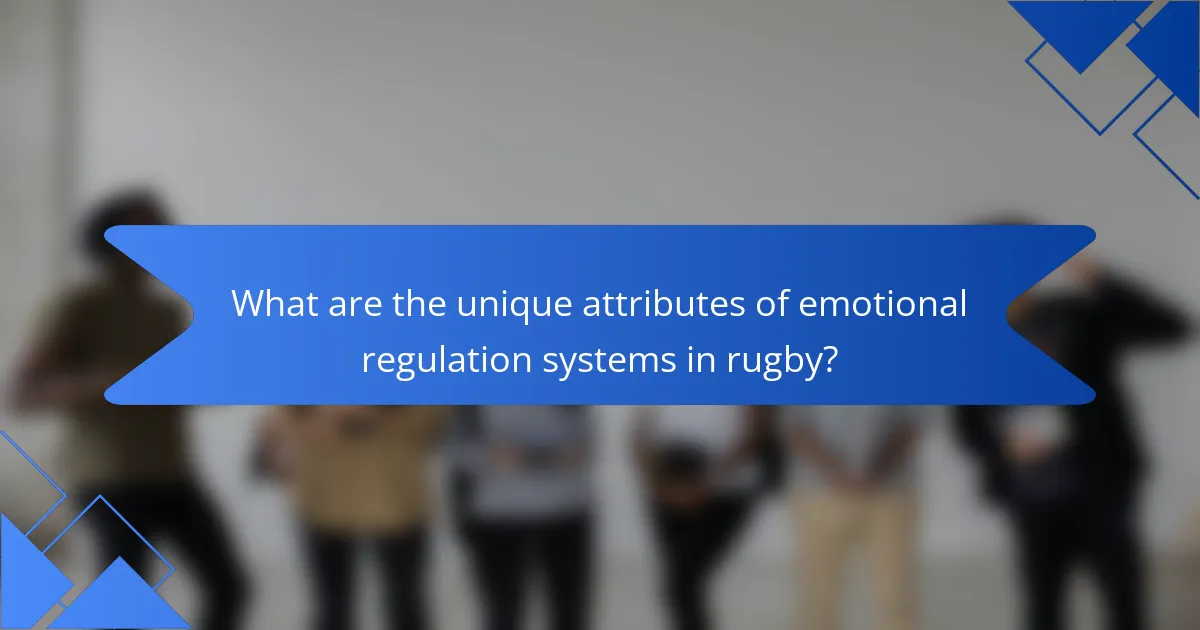
What are the unique attributes of emotional regulation systems in rugby?
Emotional regulation systems in rugby possess unique attributes that enhance player performance. Key aspects include heightened emotional intelligence, which fosters better teamwork and communication. Stress management techniques are crucial, allowing players to maintain focus under pressure. Additionally, resilience is a rare attribute, enabling players to recover quickly from setbacks during games. These elements collectively contribute to improved game performance and overall mental well-being.
How does team culture affect emotional regulation in rugby?
Team culture significantly enhances emotional regulation in rugby by fostering emotional intelligence and effective stress management. A supportive environment encourages players to express emotions, leading to improved game performance. Research indicates that teams with strong camaraderie experience lower stress levels, enabling better focus during high-pressure situations. Furthermore, positive team dynamics promote resilience, allowing players to bounce back from setbacks more effectively. This synergy between team culture and emotional regulation ultimately contributes to more cohesive and successful gameplay.
What are the individual differences in emotional regulation among rugby players?
Individual differences in emotional regulation among rugby players manifest through varying levels of emotional intelligence and stress management techniques. Research indicates that players with higher emotional intelligence tend to perform better under pressure, utilizing effective coping strategies during games. Additionally, factors such as personality traits and experience influence these differences, with seasoned players often exhibiting superior emotional control. Recognizing these variations can enhance team dynamics and overall performance.
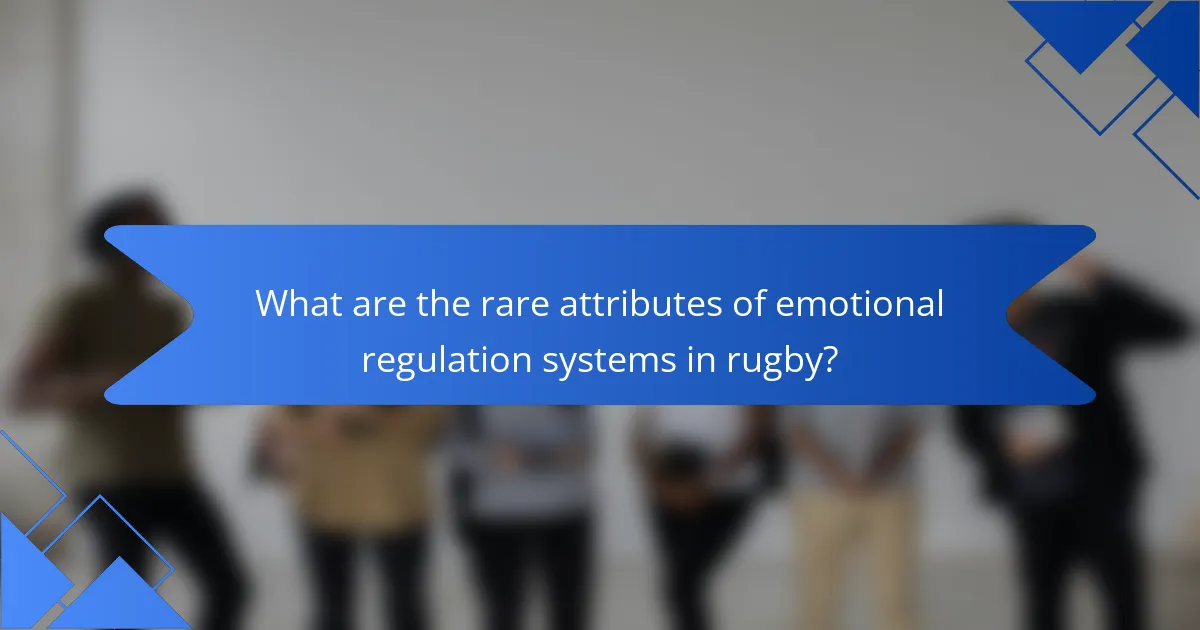
What are the rare attributes of emotional regulation systems in rugby?
The rare attributes of emotional regulation systems in rugby include adaptability to high-pressure situations, unique coping mechanisms developed through diverse team dynamics, and the ability to harness collective emotional intelligence during critical game moments. These traits enhance performance and cohesion among players.
What exceptional cases illustrate unique emotional regulation strategies in rugby?
Exceptional cases in rugby demonstrate unique emotional regulation strategies that enhance performance. For instance, players like Richie McCaw exhibit high emotional intelligence, allowing them to maintain composure under pressure. This unique attribute contributes to team cohesion and decision-making during critical match moments. Additionally, the use of mindfulness techniques by teams such as the All Blacks showcases effective stress management, promoting focus and resilience. These strategies not only improve individual performance but also foster a positive team environment, ultimately leading to better game outcomes.
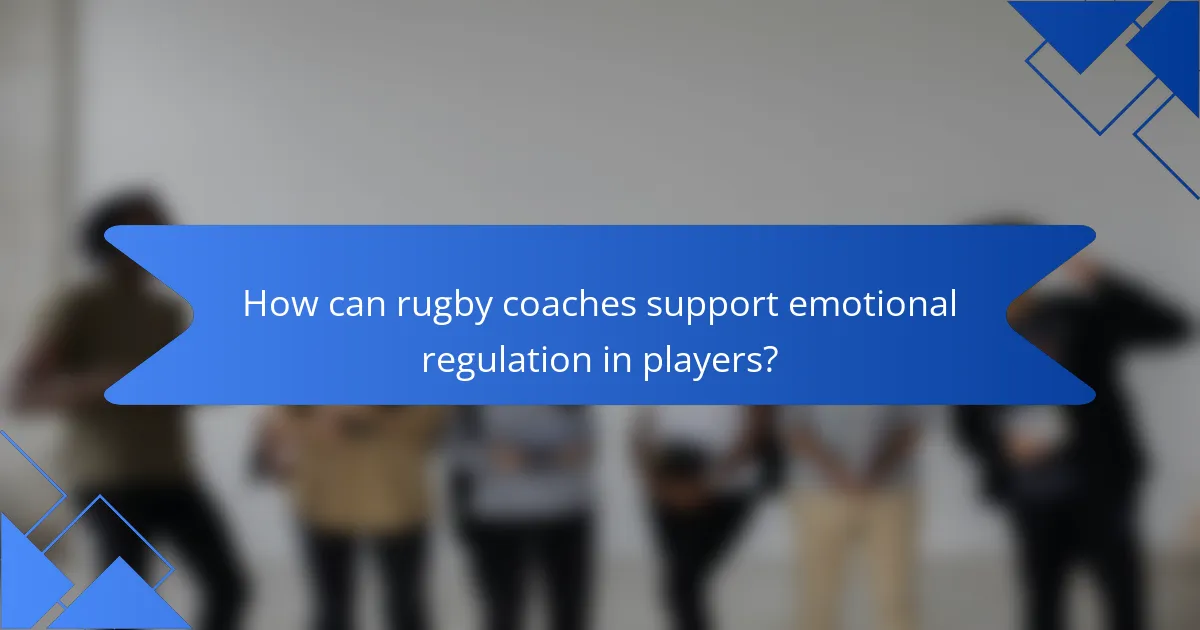
How can rugby coaches support emotional regulation in players?
Rugby coaches can support emotional regulation by fostering emotional intelligence, teaching stress management techniques, and enhancing game performance. Coaches should create a safe environment where players feel comfortable expressing emotions.
Training sessions can include mindfulness exercises that help players recognize and manage their emotional responses during games. Encouraging open communication allows players to share their feelings and experiences, which builds team cohesion and trust.
Additionally, coaches can implement strategies such as visualization and breathing exercises to help players cope with high-pressure situations. By focusing on emotional regulation, coaches can improve players’ resilience and overall performance on the field.
Ultimately, integrating emotional regulation into coaching practices leads to a more supportive atmosphere, enhancing both individual and team success.
What strategies can coaches implement to enhance emotional intelligence?
Coaches can enhance emotional intelligence by implementing strategies that promote self-awareness and empathy. Focus on developing communication skills, encouraging open dialogue, and providing feedback. Incorporate mindfulness practices to improve emotional regulation and stress management. Foster a supportive team environment that values emotional expression and understanding.
What common mistakes do coaches make regarding emotional regulation?
Coaches often overlook the importance of developing emotional intelligence in players. They may fail to recognize the impact of stress management on performance. Additionally, some coaches neglect to create a supportive environment for emotional expression. Misunderstanding individual emotional triggers can lead to ineffective communication. Lastly, a lack of training in emotional regulation techniques can hinder overall team cohesion.
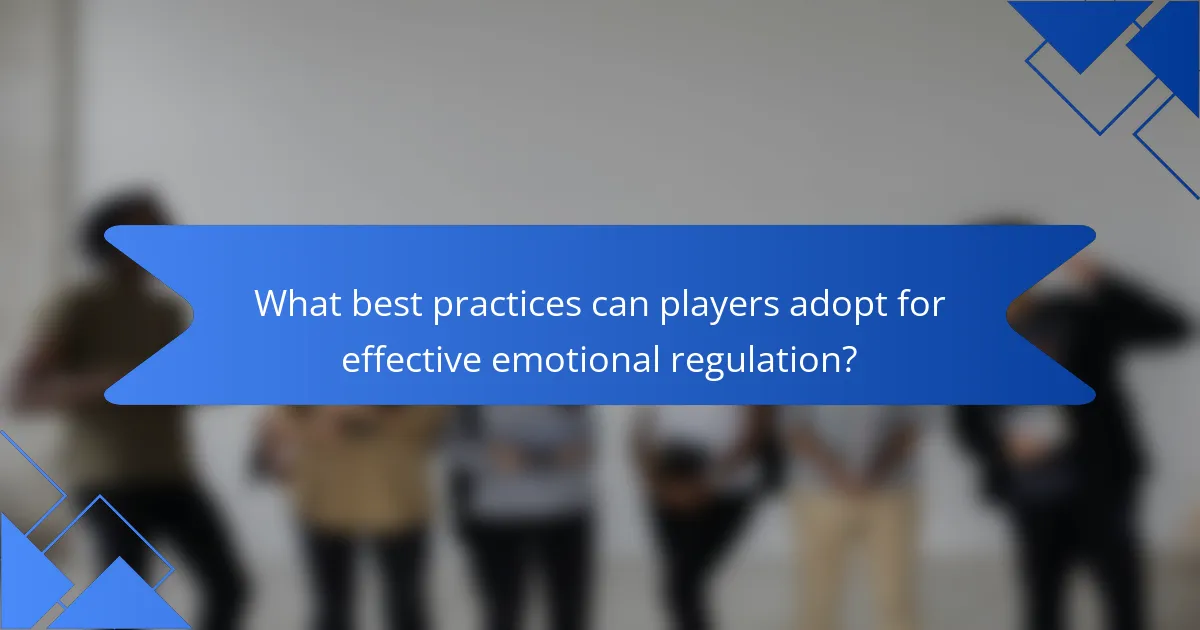
What best practices can players adopt for effective emotional regulation?
Players can adopt several best practices for effective emotional regulation, enhancing their emotional intelligence and stress management during games. These practices include mindfulness techniques, which help players stay present and focused. Regular physical training not only builds stamina but also boosts mental resilience. Establishing a supportive team environment fosters open communication, allowing players to express emotions constructively. Additionally, visualization and positive self-talk can reinforce confidence and reduce anxiety before and during matches. By integrating these strategies, players can significantly improve their game performance through better emotional regulation.
How can players apply emotional regulation techniques during matches?
Players can apply emotional regulation techniques during matches by practicing mindfulness, deep breathing, and positive self-talk. These methods enhance emotional intelligence, enabling athletes to manage stress effectively and maintain focus on performance. Mindfulness helps players stay present, reducing anxiety. Deep breathing techniques lower physiological stress responses, promoting calmness. Positive self-talk boosts confidence and shifts mindset, improving game performance. Regular practice of these techniques builds resilience, allowing players to handle pressure during critical moments in matches.
What ongoing training is recommended for improving emotional regulation skills?
Ongoing training for improving emotional regulation skills in rugby includes mindfulness practices, cognitive-behavioral techniques, and scenario-based simulations. Mindfulness enhances awareness of emotions, while cognitive-behavioral techniques help in reframing negative thoughts. Scenario-based simulations provide real-time stress management experience, improving game performance. Regular workshops and peer feedback sessions can also reinforce these skills, fostering emotional intelligence among players.
